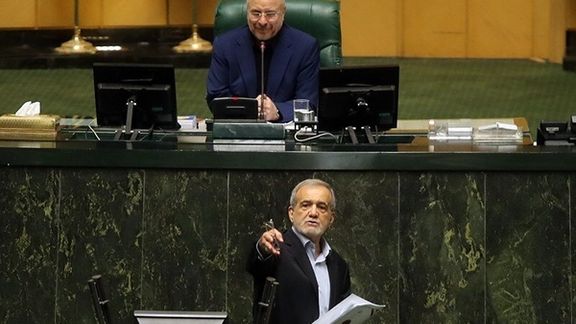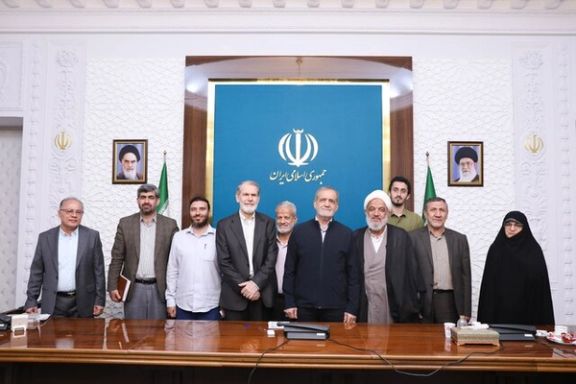Iran's domestic politics smolder beneath the ashes of war

Iran's domestic political landscape continues to simmer beneath the ashes of missile attacks and proxy wars, filled with its characteristic complexities and contradictions.

Iran's domestic political landscape continues to simmer beneath the ashes of missile attacks and proxy wars, filled with its characteristic complexities and contradictions.
President Massoud Pezeshkian, elected on a "reformist" platform, recently held a meeting with his chief political adversaries, the ultraconservative Paydari Party, in what appeared to be an invitation to form an undeclared coalition with the very opponents of his "national reconciliation" agenda. This unexpected move has fueled speculation about potential realignments within Iran’s political landscape and raised questions about the future of Pezeshkian’s reform oriented political promises.
This coalition is not welcomed by Pezeshkian's "reformist" allies, who played a key role in securing his victory in one of the most tepid and contentious elections in the country's modern history. Meanwhile, ultraconservatives did everything in their power to block his path, backing his main rival, Saeed Jalili, as their preferred candidate for the presidency of the Islamic Republic.
While Jalili and other hardliners continue their fierce rivalry with Pezeshkian, the President seems to have attempted to win the hearts and minds of the party's rank and file.
The government-owned Iranian Students New Agency (ISNA) reported on Monday that Pezeshkian has held a meeting "with a group of the Paydari Front's members and representatives" during which he listened to their views on various issues and explained his national reconciliation doctrine as well as the reasons behind the country's political, economic and cultural problems, according to ISNA. This is typical Iranian official reporting which is always devoid of details and elaboration.

However, Pezeshkian emphasized to his Paydari Party guests that his vision of national reconciliation "is not a choice, but an essential requirement for addressing the country’s challenges and safeguarding it against foreign threats."
Until recently, Majles Speaker Mohammad Bagher Ghalibaf was regarded as Pezeshkian's strongest ally in Parliament. However, growing opposition among lawmakers to the appointment of two parliament members as governors of Kordestan and Fars Provinces may have pushed Pezeshkian closer to Ghalibaf's rival, the ultraconservative Paydari Party.
The opposition, however, seems to center primarily on the fact that the two governors were appointed before their formal resignation from the Majles was approved. In other words, Ghalibaf’s frustration may stem from the President's failure to consult him in advance about the appointments, rather than any deeper political disagreement.
According to ISNA, Pezeshkian told Paydari members at the meeting: "My only purpose is to solve the country's problems, and I am calling on the followers of all schools of thought to cooperate with us rather than fight us."
Some reformists however have criticized Pezeshkian for seeking to cooperate with the ultraconservatives. Reformist journalist Ali Talebzadeh wrote in a post on X: "Although it is the Pezeshkian'd administration, all of its middle and senior managers come from the Raisi administration. Another reformist journalist Mohammad Aghazadeh wrote: "What would Jalili have done had he won the election that Pezeshkian is not doing? Everyone acts in the same way that the system wants them to act. Nothing more. There are no differences between Iranian politicians." He added sarcastically: "That is the only meaning of national reconciliation."
Highlighting the irony of reconciliation among political rivals without addressing the public's grievances, another user commented: "They talk about national reconciliation, yet they beat protesting pensioners outside the President's Office. They threaten a university student, barring her from continuing her education for a second time, despite promises of reconciliation. Do you still believe it matters who holds the office of President?"
Reformist politicians, however, have a different idea. Cleric Mohammad Ali Abtahi wrote that "I believe Pezeshkian's national reconciliation is a continuation of [former reformist President Mohammad] Khatami's reforms. The people are tired of disputes between various parties. I hope Pezeshkian's dialogue with other political groups is mindful of social realities. Most people ignored the idea of reconciliation by not voting in the elections. We need to find a way to start a dialogue with them."